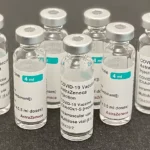Last updated: 6/29/2024
Kansas Attorney General Kris Kobach has filed a lawsuit against Pfizer, accusing the pharmaceutical giant of misleading the public about the safety and effectiveness of its COVID-19 vaccine.
It is not new that Pfizer is a well-known criminal. (1) What is new, however, are the latest accusations…
The lawsuit claims Pfizer hid critical information about the vaccine's risks, including potential links to heart inflammation and pregnancy complications. According to the suit, Pfizer also falsely represented the vaccine's ability to prevent COVID-19 transmission and its efficacy against variants.
Oxford Professor Carl Heneghan has extracted the main points from Kansas Attorney General's lawsuit against Pfizer, and they're damning.
1. Pfizer used its confidentiality agreements with the U.S. Government and others to conceal, suppress, and omit material facts relating to… pic.twitter.com/PY6RePD354
— KanekoaTheGreat (@KanekoaTheGreat) June 27, 2024
Kobach's lawsuit, filed in the District Court of Thomas County, Kansas, alleges that Pfizer's actions violated the Kansas Consumer Protection Act. The AG contends that Pfizer's misinformation influenced millions of Americans' urgent and critical health decisions, particularly during the pandemic's peak.
Collusion with Big Tech
The lawsuit also accuses Pfizer of working with Big Tech companies to suppress information and censor critical speech about the vaccine. The complaint highlights instances where Pfizer allegedly pressured social media platforms to silence voices questioning the vaccine's safety and efficacy.

Notably, the lawsuit mentions Scott Gottlieb, a Pfizer board member, who reportedly contacted Twitter (now X) to censor a journalist's article criticizing Dr. Anthony Fauci.
According to Kobach, this alleged collusion with Big Tech companies aimed to maintain a positive public perception of the vaccine while hiding adverse effects and shortcomings. The lawsuit suggests that such actions undermined public trust and transparency during a global health crisis.
Pfizer's Response and Broader Implications
Pfizer has denied the allegations, maintaining that its COVID-19 vaccine is safe and effective, supported by extensive clinical trials and real-world data. However, this lawsuit is not an isolated case.
Kansas joins Texas and Florida, which have also taken legal action against Pfizer for similar reasons. These lawsuits highlight pharmaceutical companies' growing demand for accountability over their pandemic response.
The legal battles reflect a broader public concern about transparency and trust in public health initiatives. As more states consider joining the lawsuit, there is a push for thorough investigations into how COVID-19 vaccines were promoted and the information shared with the public.
Pfizer's History of Legal Issues
Pfizer's current legal troubles are not its first. The company has a long history of legal issues, including criminal activities. Over the years, Pfizer has faced numerous lawsuits and fines for illegal marketing, fraudulent practices, and safety violations. These cases have involved false claims about drug efficacy, illegal promotion of drugs for unapproved uses, and failure to report safety data.
One of the most significant cases was in 2009 when Pfizer agreed to a $2.3 billion settlement with the U.S. Department of Justice for fraudulent marketing. This was the largest healthcare fraud settlement in history at the time. The company was found to have illegally promoted four drugs, including the painkiller Bextra, which was later withdrawn from the market due to safety concerns.
The lawsuit filed by Kansas Attorney General Kris Kobach against Pfizer underscores the ongoing scrutiny and legal challenges pharmaceutical companies face in the wake of the COVID-19 pandemic.
As the legal proceedings unfold, the focus will be on uncovering the truth about Pfizer's vaccine promotion practices and ensuring accountability for any misleading claims. This case and others highlight the critical need for transparency and integrity in public health communications.
A Few Historical Criminal Allegations Against Pfizer
- Fraudulent Marketing and Healthcare Fraud: Pfizer has faced numerous lawsuits for fraudulent marketing practices and healthcare fraud related to various drugs, including Protonix, Prempro, Chantix, Depo-Testosterone, Effexor, Zoloft, Eliquis, and Lipitor. The company has been accused of making false claims about the safety and efficacy of these drugs.
- Murder in Unapproved Clinical Trials: In 1996, Pfizer conducted unauthorized clinical trials in Nigeria, administering the experimental drug Trovan to children without proper consent. This led to the deaths of 11 children and left many others disabled. Pfizer settled the case out of court, paying $175,000 to each affected family.
- Price Gouging: The UK's competition watchdog fined Pfizer and Flynn Pharma £84.2 million for significantly increasing the price of the epilepsy drug Epanutin. The price for a 100mg pack of the drug skyrocketed from £2.83 to £67.50, representing a 2600% increase.
- Tax Evasion: Pfizer planned a $160 billion merger with Allergan, a drug firm based in Ireland to dodge U.S. taxes. This move was primarily a change of address to evade taxes while continuing to operate mainly from the U.S. The merger was terminated after the Obama administration intervened.
- Censorship and Suppression of Information: Pfizer has been accused of colluding with social media platforms and tech companies to censor critical information about its COVID-19 vaccine. The company allegedly pressured platforms like Twitter to suppress posts and articles questioning the vaccine's safety and efficacy.

Carl Riedel is an experienced writer and Open Source Intelligence (OSINT) specialist, known for insightful articles that illuminate underreported issues. Passionate about free speech, he expertly transforms public data into compelling narratives, influencing public discourse.













